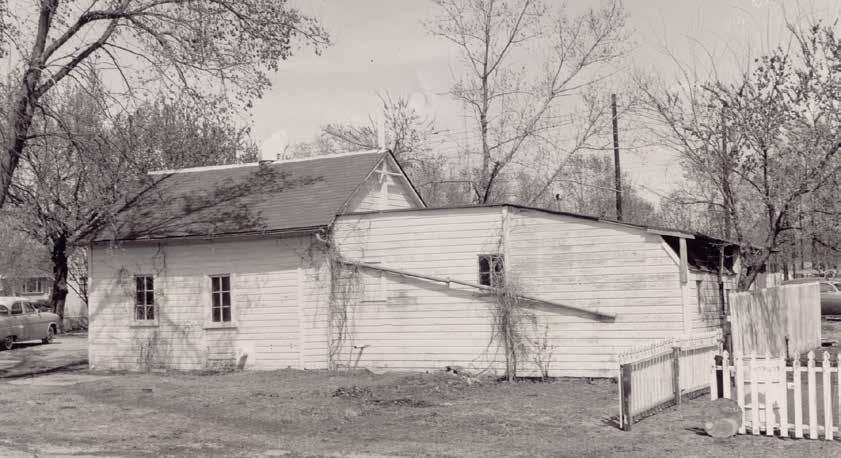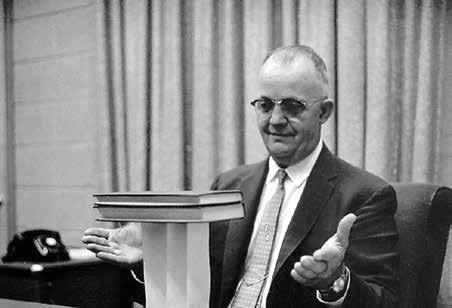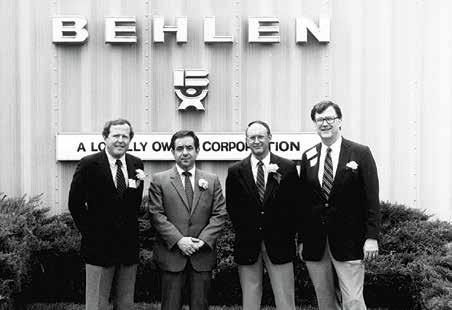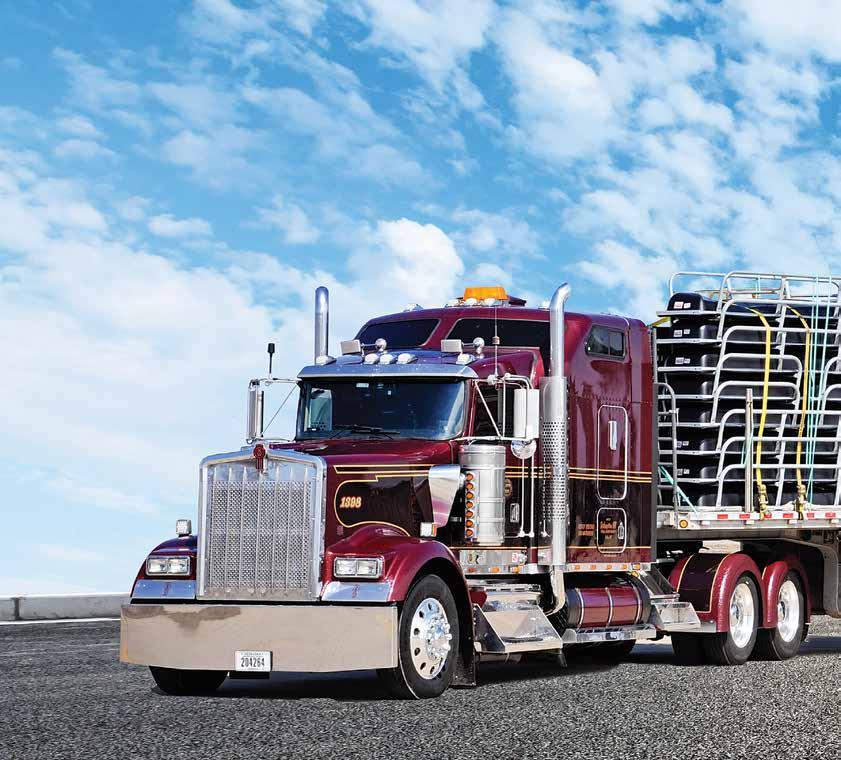
7 minute read
The Test of Time
The Test of Time
by Megan Naber, Behlen Manufacturing
Advertisement
photos courtesy Behlen Manufacturing
Adaptability and enthusiasm keeps the Behlen Manufacturing Co. going strong.
Creativity was the name of the game in 1936, when Walt Behlen launched his new company in the garage behind the family home in Columbus, Nebraska. From the beginning, Walt put the emphasis on ideas – new ideas that would open the way to untapped markets.
Walt’s first successful product was not exactly earth shaking, but it did fit a very specialized need – steel toe caps for industrial wooden soled shoes. The shoes were used primarily in automobile factories to protect workers’ feet from acid and high temperature conditions. Toe caps were soon followed by an inventive idea that grew out of Walt’s experience as a railway express agent. He realized that the single-use lids on egg shipping cases were costly to egg producers, and so he came up with a practical solution – reusable egg case lid clamps. With the success of his early ventures, other product ideas were soon to follow. By 1943, Behlen had become a full-time manufacturing business.
Walt often reminisced about his startup years. “Most of the machine tool equipment in the garage was made from parts salvaged from a local junk yard,” he said. “Equipment consisted chiefly of a homemade forge, a large grinder with Babbitt bearings (which we poured ourselves from scrap metal), a welder and a number of hand tools.” Predictably, the garage was soon too small, and the enterprise expanded to a building in downtown Columbus along the Union Pacific railroad tracks. The move coincided with a major change in agriculture – the introduction of picker-shellers for corn. Taking advantage of the new technology, Behlen soon became a major supplier of corn husking rollers for use in corn pickers. Along the way, brothers Mike and Gib and their father, Fred, had formed a team to expand product development and marketing efforts. It was 1946 when a much larger (200’ x 200’) manufacturing facility was constructed on an industrial site on the east edge of Columbus. With more space to grow, the product line surged forward to serve a vibrant farm market with items such as wire-mesh corn cribs, grain bins, tractor gear boxes, and a variety of other items.

The year was 1950 when a “Honeycomb” building (as it was called at the time) was first introduced. It was truly a unique building, assembled from rolled steel panels that served as both the structural component and skin of a building. No interior framing was required. Using the new building concept, a 40,000 square foot addition was made to the existing plant. Demonstrating the inherent strength of the revolutionary design, heavy tractors were suspended from the ridge along the length of the building. The Behlen frameless structure gained nationwide recognition when it survived an atomic bomb blast during government tests at Yucca Flats, Nevada in 1955. The Behlen “Atomic Test Building” soon became popular in both commercial and agricultural markets. Continuing growth was predictable, and in 1956, the existing plant was again expanded by 80,000 square feet. The Behlen brothers seemed to have a sixth sense for high-profile promotion opportunities. Their involvement in the highly publicized atomic test was certainly an example of that sensitivity. The Behlen family enjoyed many years of growth and expansion in their many business endeavors. Time however, dictated a change in ownership structure, which led to an eventual acquisition by the Wickes Corporation, then based in Saginaw, Michigan.
- Walt Behlen, Behlen Manufacturing _____ _____

Walt Behlen, founder of Behlen Manufacturing Company.

The management team that purchased the company in 1984 made of TR Raimondo, Dick Casey, Bob Theilen, Steve McGill.
The Wickes Corporation had a business philosophy not unlike other growing corporations of the time; i.e. growth for the sake of growth. They were a big and successful organization. Their goal was to get bigger. Behlen became a target for acquisition for two reasons: first, because the company was showing sound profits; second, because Walt Behlen and his brothers were approaching retirement ages, and family ownership would eventually present estate problems. They closed the deal and Wickes took the reins. Behlen was performing well and generating strong cash flow when Wickes acquired it in 1969. Wickes used this cash for funding its own aggressive corporate expansion and acquisition plans. Unfortunately, a significant amount of cash was moved out of Behlen for these purposes and very little was left for Behlen capital improvements.

The year was 1982 when Wickes filed for Chapter 11 bankruptcy, and it was also the year TR Raimondo was first introduced to Behlen. At the outset, when TR joined, Wickes stood by its commitment to stand behind Behlen, and funding an expansion program was part of that commitment. Over the next twelve months, $6 million in new capital was invested in Behlen. In fact, Behlen received as much capital infusion in one year as it had received from the corporation in the prior twelve years. But neither Wickes nor TR could foresee the serious blow that was about to hit Behlen’s core business, i.e., grain storage, handling and drying equipment.
It became apparent that Wickes, struggling to come out of Chapter 11 bankruptcy, could neither sustain efforts to diversify Behlen nor could they wait for grain storage markets to return. In 1984, TR was presented with three options; auction off the company assets and close the doors, find a willing buyer, or pursue a management buyout.
The management buyout team was comprised of TR Raimondo, CEO; Dick Casey, CFO heading up finance and accounting; Vice President Bob Theilen, who led Human Resources, Advertising and Public Relations activities; and Omaha attorney, Steve McGill, who was a personal friend of TR and was instrumental in the buyout effort. The management buyout was completed on May 4th, 1984. Now the new ownership team, TR, Dick, Bob, and Steve, had to find ways to reverse the major losses and bring stability back to Behlen. They accepted the challenge with enthusiasm. Stephen McGill, a beloved Partner and attorney (whom was lost in a car accident in 1997), initiated acquisitions with TR and the business unit leaders to create Behlen Country which was a key diversification.

Behlen Mfg. Co. started manufacturing livestock equipment with the purchase of Farmaster Gate Company in the mid 1980’s. Evolving into what is now Behlen Country, the largest business unit of Behlen Mfg. Co. and one of the leading livestock equipment manufacturers in the United States. Other business units under the Behlen umbrella include: Behlen Building Systems, Behlen Grain Systems, and International and Diversified Products, as well as others. The company currently employs 960 people. Many of the employees are farmers and ranchers themselves and enjoy testing new products on their operations. The largest end-user customer group is small to medium sized livestock operators and landowners.
- Greg Eickmeier Regional Sales Manager, Behlen Country

Today, the Raimondo family owns Behlen Mfg. Co., and the headquarters is still in Columbus, Nebraska. In an effort to better service their customers, they own two other manufacturing plants in Baker City, Oregon and McGregor, Texas. These three locations allow Behlen Country to quickly and efficiently deliver products to their dealers through their inhouse transportation company, BMC Transportation, who owns and operates their own fleet of trucks and flatbed trailers.
To fill the needs of a diverse customer group, Behlen Country carries a wide assortment of products and equipment. From a variety of gates and panels, bunk and bale feeders, tanks and waterers, and a large collection of popular 3-point attachments, Behlen Country works closely with end users to deliver a comprehensive offering of products at a competitive retail price point.
“We are continuously working to engineer and manufacture new products that fit our customers’ needs”, states Greg Eickmeier, regional sales manager at Behlen Country. “Just this past year we added a new heavy-duty gate with a lifetime workmanship warranty to our Big Valley product line to fill the needs of our customers.” This Champion Gate is one of several products that Behlen Country has rolled out over the past year. These include several sizes of snow pushers and rotary tillers, as well as a wire un-roller and post hole digger.
“Quality is another rule we live by here,” Eickmeier says. “Quality both in the products we make and customer service. Our team of customer service reps are personally invested in building a lasting relationship with our customers. It’s something that we take very seriously.” Behlen Country maintains an ISO 9001 certification for product quality and reliability. By combining great products, a strong brand, and efficient operations, Behlen Country is in a leading position to offer customers the best value in farm and ranch equipment products.
learn more behlencountry.com



